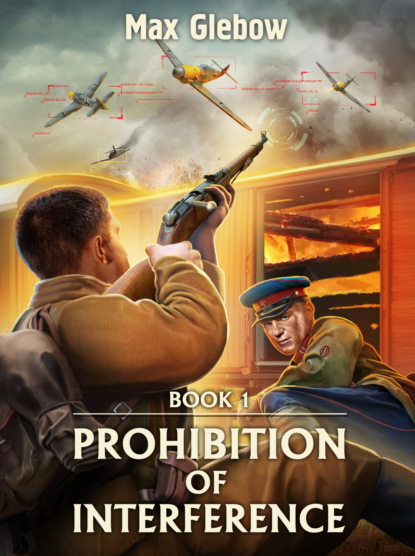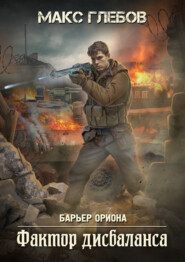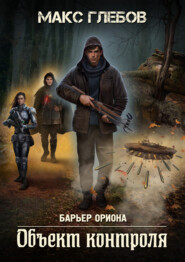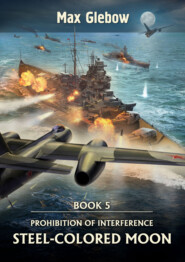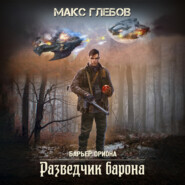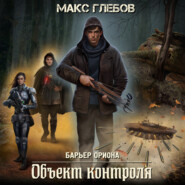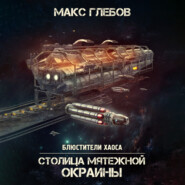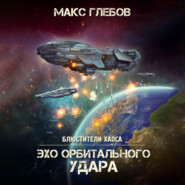По всем вопросам обращайтесь на: info@litportal.ru
(©) 2003-2024.
✖
Prohibition of Interference. Book 1
Настройки чтения
Размер шрифта
Высота строк
Поля
“I have no way to pinpoint the exact location of the fall. The fighter crashed and partially burned up in the dense layers of the planet's atmosphere. Individual pieces of debris reached the surface ten to 30 kilometers west of the landing point of the escape pod,” answered the computer and projected on the visor of my helmet a map of the surrounding region with the area of debris dispersion.
“Excellent,” I couldn't resist a caustic comment. The computer nonchalantly ignored my words.
* * *
So, what do we have as an asset? Well, first of all, a livable planet inhabited by not-so-wild people. That last statement is a bit of a stretch, of course, but considering the circumstances, Lieutenant, I wouldn't be too picky if I were you.
I know the basic aboriginal languages, thanks to Letra and her hypnolinguistic equipment. I remember local history rather superficially, but I have a pretty good idea of what has been going on here for the last hundred years, and the computer, if anything, will always tell me, so in this respect, I hope there will be no problems with naturalization.
What else? I also kept some of the technical stuff, that this world is still 200 years away from. First and foremost, of course, is the computer that survived the landing and the remnants of the network of satellites in orbit. With a functioning communications system, that's a lot. Also, there are personal weapons, although I probably shouldn't, on second thought, carry a plasma pistol, as well as any other equipment I can't explain the origin of. Consequently, I will have to hide my spacesuit, my personal weapons, and other equipment I have, except for the ones that can be worn discreetly, which I also have. Thanks to pilot foresight – we all prefer to have a backup targeting and navigation system and communications equipment, independent of the fighter, but able to work in conjunction with its computer as a last resort. In my case, they are contact lenses on which, if necessary, information is projected from a dozen pea-sized devices that are placed in various organs and tissues of my body. For example, in my palms, under the skin behind my ears, in my liver, kidneys, and even my heart.
Together, these components are actually a very peculiar computer, the parts of which are somewhat separated in space, which does not prevent them from working as a unit. But our scientists have never learned how to stick anything useful into the brain – practice has shown that it is not necessary to do this, it is not good for man. In general, I will have something to surprise the locals, even without showing them high-tech devices.
Now the minuses and problems. The main thing is that I am nobody here. I came from nowhere, I do not fit into the local social environment, and it is very specific here and extremely suspicious of outsiders.
I found myself in a state that kind of suffers a paranoid disorder and suspects that almost every other citizen is an enemy and a spy, and I can hardly avoid confronting its security forces. That is, I need a clear and consistent legend. Of course, the technical level here is low, even the photos on the documents are flat, black and white and of such quality that it would be better if they did not exist at all. There are no unified databases at all, and those that do exist are on paper. In other words, it's just paradise for a rogue scout, from which I am not much different at this stage. But here's the trouble – I don't have the means to make fake documents even of this quality.
The specialists at the lunar base, of course, would have done it in no time, but the designers of the escape capsules and combat suits didn't think to equip their products with such devices. I could, of course, try to use someone else's documents, but I have to get them somewhere, which is not so easy to do in peacetime, and the age and sex must coincide, as well as the appearance, at least in general terms. And with this approach, it's easy to miscue on any little thing related to the biography of the character whose ID I'm trying to appropriate.
As I pondered all this, I was at the same time masking the crash site of the escape pod, in which I carefully packed all the things I had decided not to take with me. Naturally, I had no clothes suitable for the local environment, so I had to stay in my flight suit for the time being, that was worn under the battle suit, especially since the late spring in these latitudes did not promise any serious cold weather. The place where I found myself was a remote taiga, so I didn't have much trouble camouflaging a not-so-large capsule.
After about an hour, I checked everything again and made sure that communication with the computer left in the capsule and with the satellites in orbit was functioning properly, then I had the satellite closest to my landing point take a picture from orbit to make sure that the pilot of some plane that happens to be in these parts would not notice anything curious. The taiga had reliably swallowed up the wreckage of the fighter and the escape pod, but in a couple of places the largest debris still gleamed in the sun, and I decided to plot my route in such a way as to pass by them and finally eliminate traces of my invasion of this world.
After checking the map, I just shook my head: I was in the Tuvan People's Republic, not just anywhere. This strange state was formed in southern Siberia four years after the communist upheaval in Russia. Having survived the troubled times of the Civil War, the capture by Admiral Kolchak's troops, and the subsequent Chinese-Mongolian intervention, the republic, not without the help of the Red Army, proclaimed its independence, which was recognized by the Soviet Union and later by Mongolia. Almost the rest of the world considered this territory part of China, and refused to recognize the TPR. However, despite its formal independence, power in the republic belonged to the local Communists, who regarded Comrade Stalin as their older brother and teacher.
With my European appearance, it was not so easy for me to go unnoticed among the local population. However, there were also enough Russians in the Republic, and I intended to turn this fact to my advantage.
I wasn't going to hole up in the taiga. According to predictions made by our scientists-historians with the help of the lunar base computer, it appeared, that very soon Comrade Stalin's aggressive and dangerous Western neighbor would wage war against the USSR. And, like, he has every chance of putting the Soviet Union in a very uncomfortable position, for after the revolution in this large country, under the wise leadership of the Leader and Teacher, there are, to put it mildly, ambiguous, events, so that all its many tanks and planes may not help in organizing a proper repulse to the foe.
The prospect of the mad Adolf winning and taking over much of the world did not please me at all, and that is why I originally chose Soviet Union as the landing site. My scientist friend's colleagues did not eat their bread in vain, and were rarely wrong in modeling the future of pre-space civilizations. Their calculations suggested that the brunt of the war with Hitler would fall precisely on the shoulders of Comrade Stalin and the citizens of his country, rather than on the shoulders of the Anglo-Saxons, who had already been actively fighting Adolf in Europe, the Atlantic and North Africa for two years. And on the eastern frontiers of the Soviet country, from time to time samurai Japan also looks toward Siberia, remembering the wrongs done to it at Lake Khasan and the Khalkhin Gol River. It is true that these bellicose yellow-faced characters now have much more problems with the looming American oil embargo, without which the island empire will be dead in a year if not a month, so it is unlikely that they will get into a fight with the Soviet Union. But even if war comes only from the west, the key events that will determine the fate of this world, will take place here.
The taiga on my way turned out to be really dense, but a couple of dozen kilometers from the drop point the satellites saw an abandoned Old Believers' farmstead, to which I was now approaching. Given that I needed a believable legend and at least some local clothes, it certainly made sense for me to check the place out.
I had no experience walking through the taiga, so my speed left a lot to be desired. I had to go, as they say, using general erudition, since pilot training did not devote much time to the problems of survival in the forests and jungles of the oxygen planets, to say the least.
I reached the lodge when it got noticeably darker. The place really turned out to be long abandoned. Those who once lived here apparently went into the taiga and never came back. There could be many reasons for this. There were plenty of dangerous predators around, and I had more than once praised myself for that I had decided at the last moment to bring my standard pistol.
The horizontal pole fence had long since lost its battle with the rain and wind, and in many places it was gaping holes. Things were no better with the outbuildings, which stood on the perimeter of the vast yard overgrown with grass and young trees. It didn't take long to examine them. If there had ever been anything of value in those animal barns and pens, it was now just shapeless piles of decay.
The house was somewhat better preserved. The thick logs held up for now, and the owners had renewed the roof, apparently just before they disappeared. The door was a little warped, but it still seemed pretty solid. It was bolted from the outside, but there was no lock, so I, after a bit of fiddling with the rusty bolt, I entered the long-abandoned dwelling.
Apparently, only one person lived here. It looked like this house was once inhabited by a large family, but then, evidently, something happened. Maybe illness, or maybe something else. But in the end there was only one owner left. The house had two living rooms, a hallway, and something like a kitchen, although I could not identify with complete certainty the purpose of this elongated room. The roof was leaking in many places and some of the furnishings were hopelessly ruined, but some things have survived.
After a thorough search of the crudely made furniture, I found myself in possession of a pair of pants that fit me relatively well, shapeless but warm enough, three shabby shirts, some very old but neatly stitched quilted jackets, several shifts of strange-looking underwear, and, most important, a bunch of yellowed papers that clearly served as identity documents and social status documents for the locals.
I carefully read and remembered the names of the people who once lived here, their dates of birth, and in some cases – of death. The overall picture was poor. Apparently, here, in the middle of nowhere, even births and deaths were not well documented, to say nothing of other, less significant facts of citizens' biographies. But I did manage to understand some things. The documents in a separate box apparently belonged to the last inhabitant of the house – Ivan Terentyevich Nagulin, born in 1890.
Judging by the names I could make out on several covers of books blackened by time and damp, he was, like the rest of his family, Old Believer, who had gone into the woods with his parents at the end of the 19th century, and who had been staying in the taiga permanently ever since. Ivan Terentyevich was old enough to be my father, and after some reflection, I decided that I could not find a better option for my legend.
* * *
I was too late for the start of the war after all. An Old Believer who came out of the taiga, having decided to return to the world after his father's death, aroused natural distrust in the representatives of the Republic's authorities. The lack of other documents than my 'father's' passport, issued back in czarist Russia, also did not help my smooth entry into the local society. I was lucky enough to get some of the right words from the newspaper Tuvan Truth, published here in Russian, which was crudely pasted on the wall of the house of some official institution in Kyzyl. I surrendered to the local people's militia completely voluntarily, so I was beaten without any excess, just to prevent and to make sure I knew exactly where I ended up.
The district militia chief, to whose office I was taken after my arrest and initial processing, was rather skeptical about my words about the boring taiga and my desire to return to my ancestral homeland. It seemed that my case was not unique here, although it was quite rare. After the interrogation, which he conducted with a boredom in his eyes, he scribbled some words on a yellowish sheet of paper and summoned a sleepy guard, who took me to a cell with a dirt floor and uneven, badly painted walls. No one was going to feed me here, but they did give me some water.
Toward evening a representative of the local security service came to pick me up. This organization bore the complicated name of the Office of State Internal Political Security. Unlike the militiamen, the officer who arrived was Russian, and his uniform was of much higher quality. Guarded by a soldier armed with a rifle that was outdated even by local standards, I was taken to the central part of town in a very quaint and mercilessly stinking horse-drawn vehicle.
They didn't keep me in a cell and immediately sent me for interrogation. The specialists here were more thorough, in the sense that they beat me longer and more thoughtfully. Nevertheless, they weren't going to maim me, because they didn't seem to have anything to maim me for yet. Naturally, I offered no resistance, limiting myself to timely tensing and relaxing the necessary muscle groups, as well as making light movements of the body and limbs, which helped to minimize the damage to my body from the not too dexterous and skillful blows of the investigators.
At the first interrogation I heard no intelligible questions, except the idiotic accusations of espionage and work for subversive counterrevolutionary organizations. Naturally, I kept making round, innocent eyes, pretending complete incomprehension, and I kept bluntly telling time after time about my Old Believer father who died in the taiga, and the rest of the family, whom I barely remember, who were carried away by some contagious disease. However, the investigator didn't really insist on anything. Apparently, this was the custom here, and it was all standard psychological treatment before the normal interrogation, which took place only a week later.
I don't know how long this whole story would have lasted, and maybe I would have been sent to some mines or camps in the end, for free labor was not at all superfluous to the expanding economy of the People's Republic, but then the Führer of the German nation, Adolf Hitler, ran out of patience and ordered an attack on the USSR. Information about the outbreak of war roused the Tuvan People's Republic with unexpected force. Even I, a prisoner without rights, was made aware of this information, although they could have done without telling me about it, for I knew what was going on far better than any of the investigators here, and even better than Comrade Stalin himself, because from low orbit it was perfectly visible how endless columns of tanks and infantry were advancing toward the border, how technicians at airfields were bustling about, hanging bombs on planes, and how the whole armada, obeying the iron will of their Führer, came into motion and crossed the Soviet border to the roar of the artillery cannonade.
The Tuvan Communist government owed much to Comrade Stalin, so much so that on the same day, June 22, it declared war on Germany, and proclaimed through the Great Khural that 'The Tuvan people, led by the entire revolutionary party and government, not sparing their lives, are ready to participate with all their might and means in the struggle of the Soviet Union against the fascist aggressor until final victory over him'. How about that! And that's when I declared that I wanted to do it, too – without sparing my life and with all my might!
I don't know what I did to convince the local security service, but they didn't seem to see me as a subversive person or a real spy after all. And what can you take from a Russian who is eager to fight for Comrade Stalin in a friendly Soviet Union? Why waste energy and time on him when you can let this naive young guy go to the USSR and thereby serve the mighty neighbor by throwing him some cannon fodder. People like me – not in the sense of those who came out of the taiga without documents, but in the sense of the Russians who wanted to fight the fascist aggressors along with their Soviet brothers, there were an unexpectedly large number of them in Tuva.
In the end I was given a document that struck me as blatantly unclear and completely devoid of any means of protection against forgery. This paper stated that I was Pyotr Ivanovich Nagulin, born in 1921, Russian. And, in fact, that was it. No citizenship, no place of residence, no education, no occupation, not even a number – nothing. In general, it was possible to understand the local officials who gave me this document. I claimed that I didn't even know exactly on whose territory my father's cabin was located. I only knew roughly where to go, but I walked for many days and came out of the forest in Tuva. I said that I really wanted to go to the Soviet Union and asked the local officials to help me. Where are my papers? There weren't any, in the taiga, well, either my father lost them or hid them somewhere so that I couldn't find them.
No one was going to leave me in Tuva, and the fate of a Russian who had asked to go to war to the Soviet Union was of no interest to them at all. They somehow lived without me until I came out of the taiga, and they will evidently be able to live on later, when I go to my ancestral homeland to gain military glory or, much more likely, a tin star on my future obelisk.
* * *
The train moved slowly, as if bowing to every pole, and getting stuck for a long time at inconspicuous tiny stations. The impact of the big war could be felt here too, but so far only by the tense faces of the locals and the abundance of men in uniform.
No matter how hard I tried, the bureaucratic machine was too slow to react to external stimuli, even to those as strong as the outbreak of war. The notion that 'the Red Army is the strongest', instilled in the Soviet people by official propaganda as an immutable truth, led Soviet officials, especially those in the rear, to realize the gravity of the situation far from immediately.
In general, the fighter Pyotr Nagulin, in my person, found himself in an echelon bound for the front only at the end of July. Already the border battles, in which the best-trained cadre of the Soviet army had been killed, were over, heavy fighting near Smolensk had been going on for two weeks, the battles for Kiev and Leningrad had already unfolded, and in the south the Germans and Romanians were coming to the outskirts of Odessa. And I was slowly dragged across the vast country in a goods van with three-story bunks, packed to the limit with guys like me, who were cheerfully and confidently talking about how they would beat the Nazis – political propaganda worked here without fail.
Every few hours I closed my eyes, pretending to be asleep, and reviewed the images taken from orbit, projected onto the surface of the contact lenses. I didn't like what I saw. We were going to hell. With songs, laughter, and the reckless enthusiasm of youth.
Chapter 3
A tall guy with a round face and a perpetual smile on his lips flopped down on the bunk next to me. I've noticed him more than once – the man couldn't sit still. In addition, a senior lieutenant of the NKVD (People's Commissariat for Internal Affairs), who accompanied the train, put him in charge of our van. One could sense that in peacetime he was an incorrigible optimist, and he dragged his easy-going attitude to everything that was going on here, in this wooden wagon, which was approaching the front with replenishment for the infantry divisions that had suffered huge losses in the fighting.
“What are you so gloomy about, soldier?” the boy asked, fidgeting and making himself comfortable.
“War is no fun,” I shrugged, trying to let my disturbing neighbor know that I was not in the mood for conversation.
“You're afraid, aren't you?” There was no negativity in his voice, but rather genuine surprise, “My name is Boris and I am from Voronezh.”
“Pyotr,” I introduced myself and shook the outstretched hand, “Of course I'm afraid. It's foolish to underestimate your adversary.”
“Don't be afraid,” Boris lowered his voice, but the smile never left his face, “and keep your voice down, or better still, shut up than talk like that. If your words get through to the commissar, you'll get in trouble, and do you want that? The morale of the Red Army fighters is high and unshakable. And it should not be sapped.”
“Morale is important,” I didn't argue, “so we'll strengthen it.”
“No, Pyotr, you're not afraid,” Boris looked at me carefully, “That's what I thought at first when I heard you say that, but I guess I was wrong. You're very serious, and you seem to know something that we ordinary soldiers aren't supposed to know.”
“Excellent,” I couldn't resist a caustic comment. The computer nonchalantly ignored my words.
* * *
So, what do we have as an asset? Well, first of all, a livable planet inhabited by not-so-wild people. That last statement is a bit of a stretch, of course, but considering the circumstances, Lieutenant, I wouldn't be too picky if I were you.
I know the basic aboriginal languages, thanks to Letra and her hypnolinguistic equipment. I remember local history rather superficially, but I have a pretty good idea of what has been going on here for the last hundred years, and the computer, if anything, will always tell me, so in this respect, I hope there will be no problems with naturalization.
What else? I also kept some of the technical stuff, that this world is still 200 years away from. First and foremost, of course, is the computer that survived the landing and the remnants of the network of satellites in orbit. With a functioning communications system, that's a lot. Also, there are personal weapons, although I probably shouldn't, on second thought, carry a plasma pistol, as well as any other equipment I can't explain the origin of. Consequently, I will have to hide my spacesuit, my personal weapons, and other equipment I have, except for the ones that can be worn discreetly, which I also have. Thanks to pilot foresight – we all prefer to have a backup targeting and navigation system and communications equipment, independent of the fighter, but able to work in conjunction with its computer as a last resort. In my case, they are contact lenses on which, if necessary, information is projected from a dozen pea-sized devices that are placed in various organs and tissues of my body. For example, in my palms, under the skin behind my ears, in my liver, kidneys, and even my heart.
Together, these components are actually a very peculiar computer, the parts of which are somewhat separated in space, which does not prevent them from working as a unit. But our scientists have never learned how to stick anything useful into the brain – practice has shown that it is not necessary to do this, it is not good for man. In general, I will have something to surprise the locals, even without showing them high-tech devices.
Now the minuses and problems. The main thing is that I am nobody here. I came from nowhere, I do not fit into the local social environment, and it is very specific here and extremely suspicious of outsiders.
I found myself in a state that kind of suffers a paranoid disorder and suspects that almost every other citizen is an enemy and a spy, and I can hardly avoid confronting its security forces. That is, I need a clear and consistent legend. Of course, the technical level here is low, even the photos on the documents are flat, black and white and of such quality that it would be better if they did not exist at all. There are no unified databases at all, and those that do exist are on paper. In other words, it's just paradise for a rogue scout, from which I am not much different at this stage. But here's the trouble – I don't have the means to make fake documents even of this quality.
The specialists at the lunar base, of course, would have done it in no time, but the designers of the escape capsules and combat suits didn't think to equip their products with such devices. I could, of course, try to use someone else's documents, but I have to get them somewhere, which is not so easy to do in peacetime, and the age and sex must coincide, as well as the appearance, at least in general terms. And with this approach, it's easy to miscue on any little thing related to the biography of the character whose ID I'm trying to appropriate.
As I pondered all this, I was at the same time masking the crash site of the escape pod, in which I carefully packed all the things I had decided not to take with me. Naturally, I had no clothes suitable for the local environment, so I had to stay in my flight suit for the time being, that was worn under the battle suit, especially since the late spring in these latitudes did not promise any serious cold weather. The place where I found myself was a remote taiga, so I didn't have much trouble camouflaging a not-so-large capsule.
After about an hour, I checked everything again and made sure that communication with the computer left in the capsule and with the satellites in orbit was functioning properly, then I had the satellite closest to my landing point take a picture from orbit to make sure that the pilot of some plane that happens to be in these parts would not notice anything curious. The taiga had reliably swallowed up the wreckage of the fighter and the escape pod, but in a couple of places the largest debris still gleamed in the sun, and I decided to plot my route in such a way as to pass by them and finally eliminate traces of my invasion of this world.
After checking the map, I just shook my head: I was in the Tuvan People's Republic, not just anywhere. This strange state was formed in southern Siberia four years after the communist upheaval in Russia. Having survived the troubled times of the Civil War, the capture by Admiral Kolchak's troops, and the subsequent Chinese-Mongolian intervention, the republic, not without the help of the Red Army, proclaimed its independence, which was recognized by the Soviet Union and later by Mongolia. Almost the rest of the world considered this territory part of China, and refused to recognize the TPR. However, despite its formal independence, power in the republic belonged to the local Communists, who regarded Comrade Stalin as their older brother and teacher.
With my European appearance, it was not so easy for me to go unnoticed among the local population. However, there were also enough Russians in the Republic, and I intended to turn this fact to my advantage.
I wasn't going to hole up in the taiga. According to predictions made by our scientists-historians with the help of the lunar base computer, it appeared, that very soon Comrade Stalin's aggressive and dangerous Western neighbor would wage war against the USSR. And, like, he has every chance of putting the Soviet Union in a very uncomfortable position, for after the revolution in this large country, under the wise leadership of the Leader and Teacher, there are, to put it mildly, ambiguous, events, so that all its many tanks and planes may not help in organizing a proper repulse to the foe.
The prospect of the mad Adolf winning and taking over much of the world did not please me at all, and that is why I originally chose Soviet Union as the landing site. My scientist friend's colleagues did not eat their bread in vain, and were rarely wrong in modeling the future of pre-space civilizations. Their calculations suggested that the brunt of the war with Hitler would fall precisely on the shoulders of Comrade Stalin and the citizens of his country, rather than on the shoulders of the Anglo-Saxons, who had already been actively fighting Adolf in Europe, the Atlantic and North Africa for two years. And on the eastern frontiers of the Soviet country, from time to time samurai Japan also looks toward Siberia, remembering the wrongs done to it at Lake Khasan and the Khalkhin Gol River. It is true that these bellicose yellow-faced characters now have much more problems with the looming American oil embargo, without which the island empire will be dead in a year if not a month, so it is unlikely that they will get into a fight with the Soviet Union. But even if war comes only from the west, the key events that will determine the fate of this world, will take place here.
The taiga on my way turned out to be really dense, but a couple of dozen kilometers from the drop point the satellites saw an abandoned Old Believers' farmstead, to which I was now approaching. Given that I needed a believable legend and at least some local clothes, it certainly made sense for me to check the place out.
I had no experience walking through the taiga, so my speed left a lot to be desired. I had to go, as they say, using general erudition, since pilot training did not devote much time to the problems of survival in the forests and jungles of the oxygen planets, to say the least.
I reached the lodge when it got noticeably darker. The place really turned out to be long abandoned. Those who once lived here apparently went into the taiga and never came back. There could be many reasons for this. There were plenty of dangerous predators around, and I had more than once praised myself for that I had decided at the last moment to bring my standard pistol.
The horizontal pole fence had long since lost its battle with the rain and wind, and in many places it was gaping holes. Things were no better with the outbuildings, which stood on the perimeter of the vast yard overgrown with grass and young trees. It didn't take long to examine them. If there had ever been anything of value in those animal barns and pens, it was now just shapeless piles of decay.
The house was somewhat better preserved. The thick logs held up for now, and the owners had renewed the roof, apparently just before they disappeared. The door was a little warped, but it still seemed pretty solid. It was bolted from the outside, but there was no lock, so I, after a bit of fiddling with the rusty bolt, I entered the long-abandoned dwelling.
Apparently, only one person lived here. It looked like this house was once inhabited by a large family, but then, evidently, something happened. Maybe illness, or maybe something else. But in the end there was only one owner left. The house had two living rooms, a hallway, and something like a kitchen, although I could not identify with complete certainty the purpose of this elongated room. The roof was leaking in many places and some of the furnishings were hopelessly ruined, but some things have survived.
After a thorough search of the crudely made furniture, I found myself in possession of a pair of pants that fit me relatively well, shapeless but warm enough, three shabby shirts, some very old but neatly stitched quilted jackets, several shifts of strange-looking underwear, and, most important, a bunch of yellowed papers that clearly served as identity documents and social status documents for the locals.
I carefully read and remembered the names of the people who once lived here, their dates of birth, and in some cases – of death. The overall picture was poor. Apparently, here, in the middle of nowhere, even births and deaths were not well documented, to say nothing of other, less significant facts of citizens' biographies. But I did manage to understand some things. The documents in a separate box apparently belonged to the last inhabitant of the house – Ivan Terentyevich Nagulin, born in 1890.
Judging by the names I could make out on several covers of books blackened by time and damp, he was, like the rest of his family, Old Believer, who had gone into the woods with his parents at the end of the 19th century, and who had been staying in the taiga permanently ever since. Ivan Terentyevich was old enough to be my father, and after some reflection, I decided that I could not find a better option for my legend.
* * *
I was too late for the start of the war after all. An Old Believer who came out of the taiga, having decided to return to the world after his father's death, aroused natural distrust in the representatives of the Republic's authorities. The lack of other documents than my 'father's' passport, issued back in czarist Russia, also did not help my smooth entry into the local society. I was lucky enough to get some of the right words from the newspaper Tuvan Truth, published here in Russian, which was crudely pasted on the wall of the house of some official institution in Kyzyl. I surrendered to the local people's militia completely voluntarily, so I was beaten without any excess, just to prevent and to make sure I knew exactly where I ended up.
The district militia chief, to whose office I was taken after my arrest and initial processing, was rather skeptical about my words about the boring taiga and my desire to return to my ancestral homeland. It seemed that my case was not unique here, although it was quite rare. After the interrogation, which he conducted with a boredom in his eyes, he scribbled some words on a yellowish sheet of paper and summoned a sleepy guard, who took me to a cell with a dirt floor and uneven, badly painted walls. No one was going to feed me here, but they did give me some water.
Toward evening a representative of the local security service came to pick me up. This organization bore the complicated name of the Office of State Internal Political Security. Unlike the militiamen, the officer who arrived was Russian, and his uniform was of much higher quality. Guarded by a soldier armed with a rifle that was outdated even by local standards, I was taken to the central part of town in a very quaint and mercilessly stinking horse-drawn vehicle.
They didn't keep me in a cell and immediately sent me for interrogation. The specialists here were more thorough, in the sense that they beat me longer and more thoughtfully. Nevertheless, they weren't going to maim me, because they didn't seem to have anything to maim me for yet. Naturally, I offered no resistance, limiting myself to timely tensing and relaxing the necessary muscle groups, as well as making light movements of the body and limbs, which helped to minimize the damage to my body from the not too dexterous and skillful blows of the investigators.
At the first interrogation I heard no intelligible questions, except the idiotic accusations of espionage and work for subversive counterrevolutionary organizations. Naturally, I kept making round, innocent eyes, pretending complete incomprehension, and I kept bluntly telling time after time about my Old Believer father who died in the taiga, and the rest of the family, whom I barely remember, who were carried away by some contagious disease. However, the investigator didn't really insist on anything. Apparently, this was the custom here, and it was all standard psychological treatment before the normal interrogation, which took place only a week later.
I don't know how long this whole story would have lasted, and maybe I would have been sent to some mines or camps in the end, for free labor was not at all superfluous to the expanding economy of the People's Republic, but then the Führer of the German nation, Adolf Hitler, ran out of patience and ordered an attack on the USSR. Information about the outbreak of war roused the Tuvan People's Republic with unexpected force. Even I, a prisoner without rights, was made aware of this information, although they could have done without telling me about it, for I knew what was going on far better than any of the investigators here, and even better than Comrade Stalin himself, because from low orbit it was perfectly visible how endless columns of tanks and infantry were advancing toward the border, how technicians at airfields were bustling about, hanging bombs on planes, and how the whole armada, obeying the iron will of their Führer, came into motion and crossed the Soviet border to the roar of the artillery cannonade.
The Tuvan Communist government owed much to Comrade Stalin, so much so that on the same day, June 22, it declared war on Germany, and proclaimed through the Great Khural that 'The Tuvan people, led by the entire revolutionary party and government, not sparing their lives, are ready to participate with all their might and means in the struggle of the Soviet Union against the fascist aggressor until final victory over him'. How about that! And that's when I declared that I wanted to do it, too – without sparing my life and with all my might!
I don't know what I did to convince the local security service, but they didn't seem to see me as a subversive person or a real spy after all. And what can you take from a Russian who is eager to fight for Comrade Stalin in a friendly Soviet Union? Why waste energy and time on him when you can let this naive young guy go to the USSR and thereby serve the mighty neighbor by throwing him some cannon fodder. People like me – not in the sense of those who came out of the taiga without documents, but in the sense of the Russians who wanted to fight the fascist aggressors along with their Soviet brothers, there were an unexpectedly large number of them in Tuva.
In the end I was given a document that struck me as blatantly unclear and completely devoid of any means of protection against forgery. This paper stated that I was Pyotr Ivanovich Nagulin, born in 1921, Russian. And, in fact, that was it. No citizenship, no place of residence, no education, no occupation, not even a number – nothing. In general, it was possible to understand the local officials who gave me this document. I claimed that I didn't even know exactly on whose territory my father's cabin was located. I only knew roughly where to go, but I walked for many days and came out of the forest in Tuva. I said that I really wanted to go to the Soviet Union and asked the local officials to help me. Where are my papers? There weren't any, in the taiga, well, either my father lost them or hid them somewhere so that I couldn't find them.
No one was going to leave me in Tuva, and the fate of a Russian who had asked to go to war to the Soviet Union was of no interest to them at all. They somehow lived without me until I came out of the taiga, and they will evidently be able to live on later, when I go to my ancestral homeland to gain military glory or, much more likely, a tin star on my future obelisk.
* * *
The train moved slowly, as if bowing to every pole, and getting stuck for a long time at inconspicuous tiny stations. The impact of the big war could be felt here too, but so far only by the tense faces of the locals and the abundance of men in uniform.
No matter how hard I tried, the bureaucratic machine was too slow to react to external stimuli, even to those as strong as the outbreak of war. The notion that 'the Red Army is the strongest', instilled in the Soviet people by official propaganda as an immutable truth, led Soviet officials, especially those in the rear, to realize the gravity of the situation far from immediately.
In general, the fighter Pyotr Nagulin, in my person, found himself in an echelon bound for the front only at the end of July. Already the border battles, in which the best-trained cadre of the Soviet army had been killed, were over, heavy fighting near Smolensk had been going on for two weeks, the battles for Kiev and Leningrad had already unfolded, and in the south the Germans and Romanians were coming to the outskirts of Odessa. And I was slowly dragged across the vast country in a goods van with three-story bunks, packed to the limit with guys like me, who were cheerfully and confidently talking about how they would beat the Nazis – political propaganda worked here without fail.
Every few hours I closed my eyes, pretending to be asleep, and reviewed the images taken from orbit, projected onto the surface of the contact lenses. I didn't like what I saw. We were going to hell. With songs, laughter, and the reckless enthusiasm of youth.
Chapter 3
A tall guy with a round face and a perpetual smile on his lips flopped down on the bunk next to me. I've noticed him more than once – the man couldn't sit still. In addition, a senior lieutenant of the NKVD (People's Commissariat for Internal Affairs), who accompanied the train, put him in charge of our van. One could sense that in peacetime he was an incorrigible optimist, and he dragged his easy-going attitude to everything that was going on here, in this wooden wagon, which was approaching the front with replenishment for the infantry divisions that had suffered huge losses in the fighting.
“What are you so gloomy about, soldier?” the boy asked, fidgeting and making himself comfortable.
“War is no fun,” I shrugged, trying to let my disturbing neighbor know that I was not in the mood for conversation.
“You're afraid, aren't you?” There was no negativity in his voice, but rather genuine surprise, “My name is Boris and I am from Voronezh.”
“Pyotr,” I introduced myself and shook the outstretched hand, “Of course I'm afraid. It's foolish to underestimate your adversary.”
“Don't be afraid,” Boris lowered his voice, but the smile never left his face, “and keep your voice down, or better still, shut up than talk like that. If your words get through to the commissar, you'll get in trouble, and do you want that? The morale of the Red Army fighters is high and unshakable. And it should not be sapped.”
“Morale is important,” I didn't argue, “so we'll strengthen it.”
“No, Pyotr, you're not afraid,” Boris looked at me carefully, “That's what I thought at first when I heard you say that, but I guess I was wrong. You're very serious, and you seem to know something that we ordinary soldiers aren't supposed to know.”





